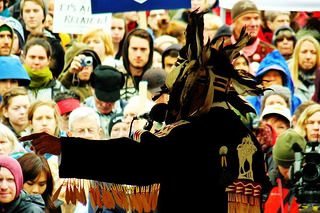How Avaaz is Using Social Media to Revolutionize the World
Gone are the days of gaining support for initiatives by going door to door
By Nikki Gill, staff writer
At first glance, the evolution of social media seems to have done more harm than good. Disgruntled tweets have cost people their jobs, Facebook messages have ended relationships, and Instagram photos were almost sold for profit without the user’s consent. However, there is a positive side to social media, and Avaaz has found it.
Avaaz is a not-for-profit organization that has fed on technology and the social media phenomenon to create a transnational community that is globally interdependent and united in the issues they support.
[pullquote]“We have a simple democratic mission to close the gap between the world we have and the world that most people ever want,” says Ricken Patel, founder of Avaaz.[/pullquote]
People Empowered
Gone are the old ways of going door to door to get signatures on a petition. Groups like Avaaz are using new technology to lobby governments around the world. They have taken over 115 million calls to action since January 2007, and have gained the traction of over 20 million members worldwide.
“We are people powered. Every campaign we run is polled and tested and developed by our community and our membership and it leverages the power of people power to press for change” explains Patel.
The global citizen is a product of the internet, and each Avaaz member is instantly connected to the issues and ideas of their peers, some of whom may reside in other parts of the world. Avaaz currently has members in 194 countries. The organization determines which campaign ideas they will support by conducting weekly polls of 10,000 member random samples. Only campaigns that receive support from 80 per cent of those members will move forward.
“What we’ve seen is… the intensity of public engagement is so much that it’s making the impossible, possible,” observes Patel.
Avaaz.org is currently involved in some of the world’s most topical issues. They recently launched a new campaign in response to the deadly gang rape of a 23-year-old woman in New Delhi, India. The new initiative, “Curing India’s Rape Epidemic: The Education Option,” outlines a campaign to use education and media outreach to transform the current attitude of many males in India who do not support women’s rights and equality of the sexes.
The objective of the campaign is to create a stigma against sexual assault and rape in India, similar to the change in attitude towards smoking cigarettes in North America. They also outline how effective educational efforts were in promoting the use of condoms to prevent the spread of HIV/AIDS in several states across India in 2008, due to the “Consistent Condom Use Programme.”
As Patel explains: “Often, it has been the more educated university students… in places like the Philippines or Indonesia that have led revolutions, but those revolutions have then empowered millions more people through education and development.”
A Voice for the Voiceless
Closer to home, Avaaz delivered a petition directly to Prime Minister Stephen Harper with over 50,000 signatures in January of this year. The petition supported Chief Theresa Spence’s hunger strike in order to receive a meeting with the Prime Minister to discuss First Nations rights. In total, the petition received 62,072 signatures from Canadians and international supporters of the cause.
Avaaz has also received celebrity endorsements for their initiatives. A current focus of the organization is ending the ivory trade in Thailand, seen as an important to ending the slaughter of elephants across Africa. Leonardo DiCaprio is one of the main voices of the initiative, which recently received a pledge from Thailand’s Prime Minister, Yingluck Shinawatra to end the ivory trade outright.

























Share the post "How Avaaz is Using Social Media to Revolutionize the World"